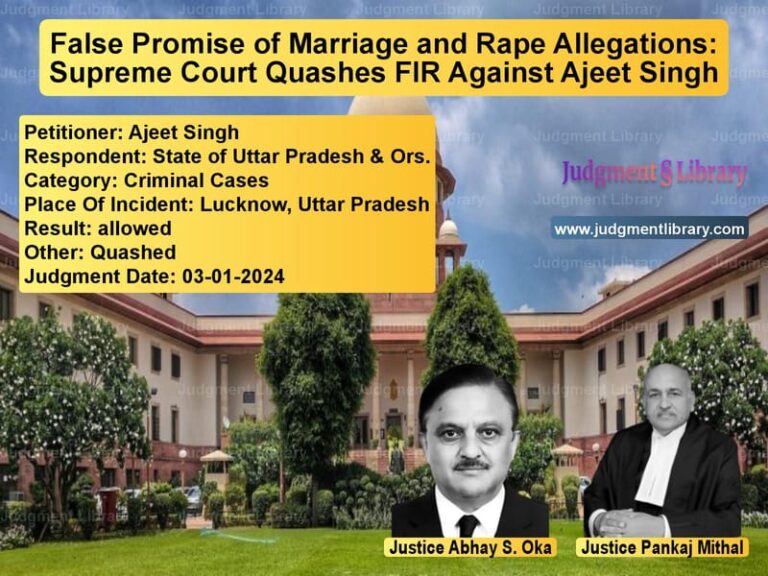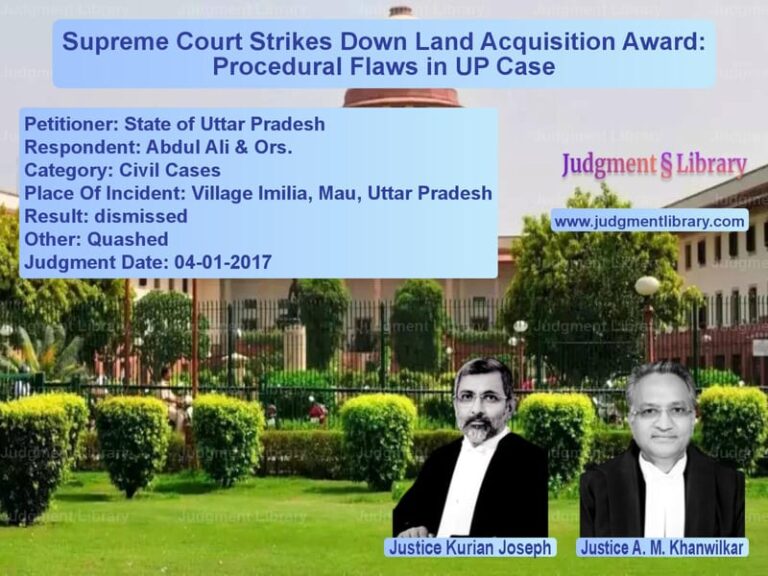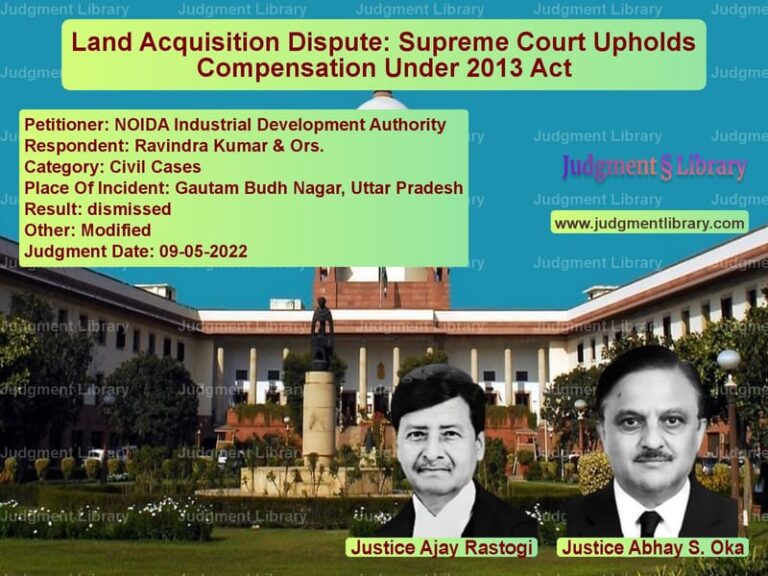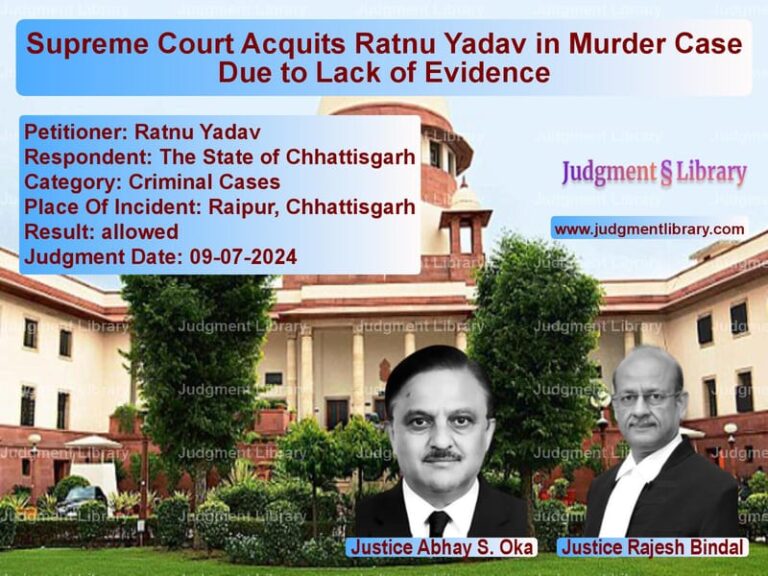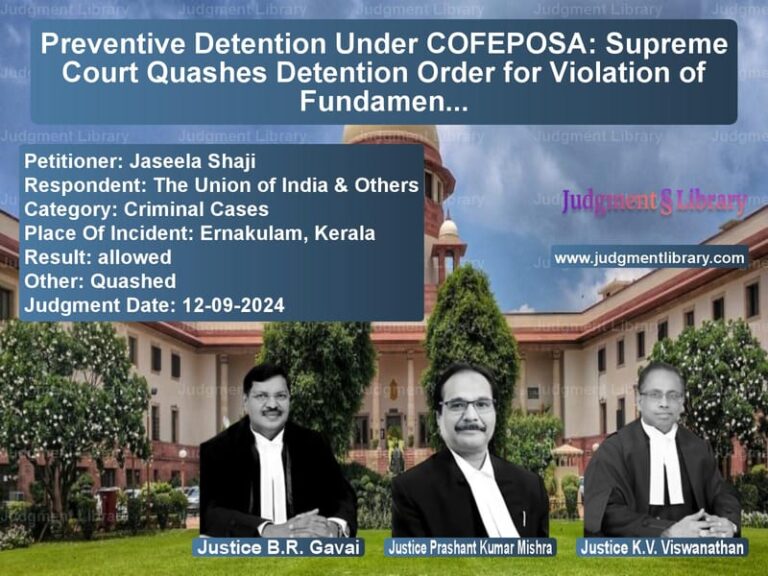Reinstatement of UPPCL Technicians: Supreme Court Overturns Termination
The Supreme Court of India recently delivered a crucial judgment in the case of Mukul Kumar Tyagi vs. State of Uttar Pradesh & Others, ruling in favor of reinstating candidates who had been unlawfully terminated from the post of Technician Grade-II (Electrical) in Uttar Pradesh Power Corporation Limited (UPPCL). The case involved disputes over the eligibility criteria for the recruitment process and whether the terminated employees had valid qualifications.
Background of the Case
The dispute began when UPPCL issued an advertisement on September 6, 2014, inviting applications for 2,211 posts of Technician Grade-II (Electrical). As per the eligibility criteria, candidates were required to possess a Certificate of 80 Hours Course on Computer Concepts (CCC) issued by the Department of Electronics and Accreditation of Computer Courses (DOEACC), now known as the National Institute of Electronics and Information Technology (NIELIT).
Several candidates who did not meet this qualification challenged the selection process before the Allahabad High Court, which quashed the selection list and directed UPPCL to revise it. Consequently, UPPCL terminated several employees, including the petitioners, on May 13, 2018. The terminated employees challenged this decision before the High Court, which ruled in their favor, but the decision was later overturned by the Supreme Court in 2019.
Legal Arguments Presented
Petitioners’ Arguments
- The petitioners, represented by Senior Counsel Dama Seshadri Naidu, Amit Anand Tiwari, and Rana Mukherjee, argued that they had the required CCC certificate at the time of their interview, as mandated by the office memorandum of January 29, 2011.
- They contended that their termination was unlawful since they met the eligibility criteria when scrutinized during the selection process.
- They also pointed out that the recruitment process was conducted over a long period (December 2014 – July 2015), during which they obtained the CCC certificate before appearing for their interviews.
Respondent’s Arguments
- The UPPCL, represented by Senior Counsel S.K. Saxena, argued that candidates must have obtained the CCC certificate before the last date of application (September 30, 2014).
- They maintained that the petitioners were ineligible since they obtained their certificates after the application deadline.
- The corporation contended that reinstating these candidates would undermine the integrity of the recruitment process.
Supreme Court’s Analysis and Ruling
The Supreme Court, in its ruling, noted several key aspects of the case:
- The advertisement explicitly required candidates to produce the CCC certificate at the time of the interview, not at the time of application submission.
- The Allahabad High Court’s earlier ruling had only quashed the selection of candidates who did not possess a valid CCC certificate at all.
- The petitioners had submitted the required certificate during their interviews and were duly selected in the merit list dated July 14, 2015.
- UPPCL’s argument regarding the last date of application was inconsistent with its own previous stance that the CCC certificate needed to be produced at the interview stage.
The Court ruled:
“We have no hesitation in holding that the services of such candidates who were selected in the merit list dated 14th July 2015 and had produced the CCC certificate at the time of the interview could not have been terminated.”
Key Observations by the Supreme Court
On the Validity of CCC Certificates
The Court reaffirmed that the requirement for possessing the CCC certificate applied at the time of the interview, not at the time of application submission. It criticized UPPCL’s misinterpretation of the regulations and found its actions arbitrary.
On Article 142 of the Constitution
The Supreme Court exercised its extraordinary jurisdiction under Article 142, stating:
“The respondent-Corporation has misinterpreted the judgment of the learned Single Judge and terminated the services of the applicants who were otherwise entitled to be continued as per the judgment.”
On the Impact of the Termination
The Court acknowledged the difficulties faced by the petitioners, who had been unlawfully removed from their jobs despite fulfilling the eligibility criteria. It noted that wrongful terminations could not be allowed to stand, as they would create a precedent for administrative arbitrariness.
Final Judgment
The Supreme Court ruled as follows:
- The appeal was allowed, and the termination orders were quashed.
- All petitioners who were in the merit list dated July 14, 2015, and had submitted the CCC certificate at the time of the interview were to be reinstated.
- While the reinstated employees would not receive back wages for the period they were out of employment, they would retain their original seniority and receive all consequential benefits, including pay fixation and terminal benefits.
Implications of the Judgment
This ruling has far-reaching implications for employment disputes in government and public sector enterprises. It establishes that:
- Recruitment authorities must adhere strictly to the eligibility conditions mentioned in advertisements.
- Administrative decisions leading to wrongful termination can be overturned if found to be based on arbitrary interpretations of rules.
- Employees wrongly terminated due to misinterpretation of eligibility criteria have legal recourse for reinstatement.
The Supreme Court’s decision in this case reinforces the importance of due process and fairness in government recruitment, preventing unjust terminations based on misinterpretation of eligibility criteria.
Petitioner Name: Mukul Kumar Tyagi.Respondent Name: State of Uttar Pradesh & Others.Judgment By: Justice B.R. Gavai, Justice K.V. Viswanathan.Place Of Incident: Uttar Pradesh.Judgment Date: 05-11-2024.
Don’t miss out on the full details! Download the complete judgment in PDF format below and gain valuable insights instantly!
Download Judgment: mukul-kumar-tyagi-vs-state-of-uttar-prade-supreme-court-of-india-judgment-dated-05-11-2024.pdf
Directly Download Judgment: Directly download this Judgment
See all petitions in Employment Disputes
See all petitions in Termination Cases
See all petitions in Recruitment Policies
See all petitions in Public Sector Employees
See all petitions in Disciplinary Proceedings
See all petitions in Judgment by B R Gavai
See all petitions in Judgment by K.V. Viswanathan
See all petitions in allowed
See all petitions in Quashed
See all petitions in supreme court of India judgments November 2024
See all petitions in 2024 judgments
See all posts in Service Matters Category
See all allowed petitions in Service Matters Category
See all Dismissed petitions in Service Matters Category
See all partially allowed petitions in Service Matters Category


